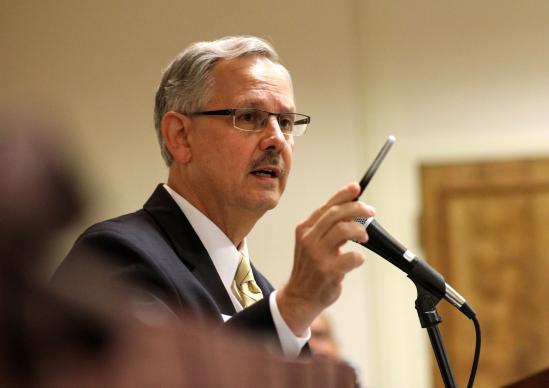
Bishop Ough sees Supreme Court decision influential to denominational debate
 Mitchell, S.D.: “The role of The United Methodist Church and all who follow Jesus is to love our neighbors and to be purveyors of peace and justice,” Bishop Bruce R. Ough, Dakotas-Minnesota Area of The United Methodist Church.
Mitchell, S.D.: “The role of The United Methodist Church and all who follow Jesus is to love our neighbors and to be purveyors of peace and justice,” Bishop Bruce R. Ough, Dakotas-Minnesota Area of The United Methodist Church.
Photo by Kathleen Barry, UMNS. Bishop Bruce R. Ough speaks during a May 18 meeting where the Connectional Table approved legislation that, if adopted by General Conference, would change some of the denomination’s rules regarding homosexuality.
The 5-4 ruling in Obergefell v. Hodges dealt with two questions: Does the U.S. Constitution allow states to prohibit same-gender marriage and can states refuse to recognize the marriages of gay couples who wed in another state? To both questions, the majority said states must recognize same-sex marriage. The legal right for same gender persons to marry does not mandate clergy persons to perform gay marriages.
The ruling will win praise from some United Methodists and trouble others. On one thing many United Methodists agree: The decision will likely add urgency to a longtime denominational debate on the church's position on homosexuality. Church law currently bans clergy from conducting same-gender marriages and forbids churches from hosting such ceremonies.
“While The United Methodist Church does not engage in partisan politics, we welcome all people and believe all have sacred worth, “ said Ough. “Today's legal decisions by the Supreme Court will undoubtedly increase the call for change from a sizeable segment of our church membership and clergy that finds our official policy unjust.”
General Conference, which meets every four years, has consistently voted to keep language that restricts gay marriage. Officiating at same-gender unions is a chargeable offense under church law.
Many petitions dealing with human sexuality will go before the 2016 General Conference. The Connectional Table, a United Methodist global leadership body, is drafting legislation that would remove the church’s prohibitive language against gay weddings, granting United Methodist clergy the pastoral discretion to perform or not to perform same-gender marriages. In contrast, members of Good News and others are proposing legislation that would instate mandatory penalties for those who officiate at same-gender weddings.
The 2016 General Conference will have 864 delegates, about 42 percent of whom will come from church regions in Africa, Europe and the Philippines. It will be up to this global body to decide what church law says in the future.